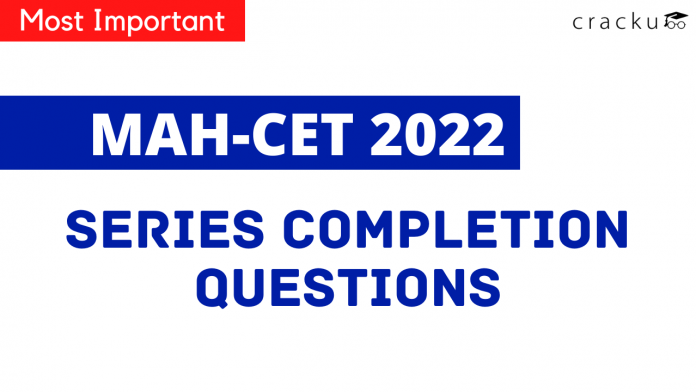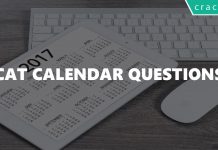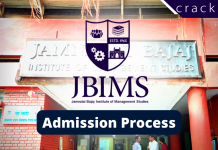Series Completion Questions for MAH – CET 2022 – Download PDF
Here you can download CMAT 2022 – important MAH – CET Series Completion Questions PDF by Cracku. Very Important MAH – CET 2022 and These questions will help your MAH – CET preparation. So kindly download the PDF for reference and do more practice.
Download Series Completion Questions for MAH – CET
Enroll to MAH-CET Crash Course
Question 1: What is the least number to be added to 2530 to make it a perfect square ?
a) 50
b) 65
c) 75
d) 80
e) None of these
Question 2: What should come in place of the question mark (?) in the following number series?
1 4 14 45 139 422 ?
a) 1268
b) 1234
c) 1272
d) 1216
e) None of these
Question 3: What should come in place of the question mark (?) in the following number series?
2 5 11 23 47 95 ?
a) 168
b) 154
c) 191
d) 172
e) None of these
Question 4: What approximate value should come in place of the question mark (?) in the following question?
$54.786 \div 10.121 \times 4.454 = ?$
a) 84
b) 48
c) 118
d) 58
e) 24
Question 5: What should come in place of the question mark (?) in the following number series ?
1, 5, 17, 53, 161, 485, ?
a) 1168
b) 1254
c) 1457
d) 1372
e) None of these
Take Free MAH-CET mock tests here
Question 6: What will come in place of the question mark (?) in the following number series?
20 23 30 43 64 ?
a) 95
b) 90
c) 100
d) 105
e) 96
Question 7: What will come in place of thequestion mark (?) in the following number series?
33 16.5 ? 24.75 49.5 123.75
a) 18.5
b) 16.5
c) 8.5
d) 8.25
e) None of these
Question 8: What will come in place of thequestion mark (?) in the following number series?
44 ? 99 148.5 222.75 334.125
a) 44
b) 55
c) 66
d) 33
e) 35
Question 9: What will come in place of thequestion mark (?) in the following number series?
121 238 472 ? 1876 3748
a) 1008
b) 948
c) 944
d) 940
e) 1005
Question 10: What will come in place of the question mark (?) in the following number series?
9 10 39 220 ? 14382
a) 1589
b) 1598
c) 1958
d) 1985
e) 1835
Question 11: What will come in the place of question mark (?) in the following series ?
2 9 28 65 ?
a) 96
b) 106
c) 126
d) 130
e) None of these
Question 12: What would be the compound interest accrued on an amount of Rs. 9,000 at the rate of 11 p.c.p.a. in two years ?
a) Rs. 2089.90
b) Rs. 2140.90
c) Rs. 2068.50
d) Rs. 2085.50
e) None of these
Question 13: 16 8 12 30 ? 472.5
a) 104
b) 103
c) 106
d) 105
e) None of these
Question 14: 2, 5, 12, 27, 58, ?
a) 122
b) 121
c) 123
d) 120
e) None of these
Question 15: 18 19.7 16.3 23.1 9.5 ?
a) 36.5
b) 36.8
c) 36.7
d) 36.9
e) None of these
Question 16: 68, ?, 77, 104, 168, 293
a) 69
b) 70
c) 68
d) 74
e) None of these
Question 17: In how many different ways can the numbers ‘256974’ be arranged, using each digit only once in each arrangement, such that the digits 6 and 5 are at the extreme ends in each arrangement ?
a) 48
b) 720
c) 36
d) 360
e) None of these
Question 18: What will come in place of both the question marks (?) in the following question ?$\frac{(?)^{0.6}}{104}=\frac{26}{(?)^{1.4}}$
a) 58
b) -48
c) -56
d) 42
e) -52
Question 19: Out of the fractions $\frac{1}{2}, \frac{7}{8}, \frac{3}{4}, \frac{5}{6}$, and $\frac{6}{7}$ what is the difference between the largest and smallest fractions ?
a) $\frac{7}{13}$
b) $\frac{3}{8}$
c) $\frac{4}{7}$
d) $\frac{1}{6}$
e) None of these
Question 20: If $(11)^{3}$ is subtracted from $(46)^{2}$ . what will be the remainder ?
a) 787
b) 785
c) 781
d) 783
e) None of these
Get 5 MAH-CET mocks at just Rs.299
Answers & Solutions:
1) Answer (E)
We know that $50^2 = 2500$ and $51^2 = 2601$
$\because$ 2500 < 2530 < 2601
$\therefore$ Required number = 2601 – 2530 = 71
2) Answer (C)
The pattern here followed is :
1 * 3 + 1 = 4
4 * 3 + 2 = 14
14 * 3 + 3 = 45
45 * 3 + 4 = 139
139 * 3 + 5 = 422
422 * 3 + 6 = 1272
3) Answer (C)
The pattern here followed is :
2 * 2 + 1 = 5
5 * 2 + 1 = 11
11 * 2 + 1 = 23
23 * 2 + 1 = 47
47 * 2 + 1 = 95
95 * 2 + 1 = 191
4) Answer (E)
Expression : $54.786 \div 10.121 \times 4.454 = ?$
= $\frac{55}{10} \times 4.5$
= $24.75 \approx 24$
5) Answer (C)
The pattern here followed is :
1 * 3 + 2 = 5
5 * 3 + 2 = 17
17 * 3 + 2 = 53
53 * 3 + 2 = 161
161 * 3 + 2 = 485
485 * 3 + 2 = 1457
6) Answer (A)
Numbers of the form $n^2 – (n-1)$ are added, where $n$ is an integer starting from 2
23 $+ 2^2 – 1$ = 23
23 $+ 3^2 – 2$ = 30
30 $+ 4^2 – 3$ = 43
43 $+ 5^2 – 4$ = 64
64 $+ 6^2 – 5$ = 95
7) Answer (B)
The pattern followed is :
33 $\times \frac{1}{2}$ = 16.5
16.5 $\times \frac{2}{2}$ = 16.5
16.5 $\times \frac{3}{2}$ = 24.75
24.75 $\times \frac{4}{2}$ = 49.5
49.5 $\times \frac{5}{2}$ = 123.75
8) Answer (C)
Each number is multiplied by $\frac{3}{2}$
44 $\times \frac{3}{2}$ = 66
66 $\times \frac{3}{2}$ = 99
99 $\times \frac{3}{2}$ = 148.5
148.5 $\times \frac{3}{2}$ = 222.75
222.75 $\times \frac{3}{2}$ = 334.125
9) Answer (D)
Each number is multiplied by 2 and then 4 is subtracted from it.
121 $\times 2 – 4$ = 238
238 $\times 2 – 4$ = 472
472 $\times 2 – 4$ = 940
940 $\times 2 – 4$ = 1876
1876 $\times 2 – 4$ = 3748
10) Answer (A)
The pattern followed is :
9 $\times 1 + 1^2$ = 10
10 $\times 3 + 3^2$ = 39
39 $\times 5 + 5^2$ = 220
220 $\times 7 + 7^2$ = 1589
1589 $\times 9 + 9^2$ = 14382
11) Answer (C)
Each number is of the form $(n^3+1)$ where $n$ is a natural number
$1^3+1$ = 2
$2^3+1$ = 9
$3^3+1$ = 28
$4^3+1$ = 65
$5^3+1$ = 126
=> Ans – (C)
12) Answer (E)
$C.I. = P [(1 + \frac{R}{100})^T – 1]$
= $9000 [(1 + \frac{11}{100})^2 – 1]$
= $9000 [(1.11)^2 – 1]$
= $9000 \times (1.2321 – 1)$
= $9000 \times 0.2321$ = Rs. $2,088.90$
13) Answer (D)
Odd multiples of $\frac{1}{2}$ are multiplied
16 $\times \frac{1}{2}$ = 8
8 $\times \frac{3}{2}$ = 12
12 $\times \frac{5}{2}$ = 30
30 $\times \frac{7}{2}$ = 105
105 $\times \frac{9}{2}$ = 472.5
14) Answer (B)
Each number is multiplied by 2 and then consecutive natural numbers are added
2 $\times 2 + 1$ = 5
5 $\times 2 + 2$ = 12
12 $\times 2 + 3$ = 27
27 $\times 2 + 4$ = 58
58 $\times 2 + 5$ = 121
15) Answer (C)
The pattern is :
18 $+ 1.7 \times 2^0$ = 19.7
19.7 $- 1.7 \times 2^1$ = 16.3
16.3 $+ 1.7 \times 2^2$ = 23.1
23.1 $- 1.7 \times 2^3$ = 9.5
9.5 $+ 1.7 \times 2^4$ = 36.7
16) Answer (A)
Cubes of consecutive natural numbers are added
68 $+ 1^3$ = 69
69 $+ 2^3$ = 77
77 $+ 3^3$ = 104
104 $+ 4^3$ = 168
168 $+ 5^3$ = 293
17) Answer (A)
Case 1 : 6 at left end and 5 is at right end : 6 _ _ _ _ 5
Now, four empty places can be filled by 2,9,7 and 4 in = $4!$ ways
= $4 \times 3 \times 2 \times 1 = 24$
Case 2 : 6 at right end and 5 at left end : 5 _ _ _ _ 6
Similarly, no. of ways = $4!$
= $4 \times 3 \times 2 \times 1 = 24$
$\therefore$ Total no. of ways = $24 + 24 = 48$
18) Answer (E)
$\frac{(x)^{0.6}}{104}=\frac{26}{(x)^{1.4}}$
${(x)^{0.6}} * {(x)^{01.4}}$ = 104*26
${(x)^{2}}$ = 104*26
x = ±52
19) Answer (B)
Given values are ,
$\frac{1}{2}$ = 0.5
$\frac{7}{8}$ = 0.87
$\frac{3}{4}$ = 0.75
$\frac{5}{6}$ = 0.83
$\frac{6}{7}$ = 0.86
∴ Required difference = $\frac{7}{8}$ – $\frac{1}{2}$ = (7-4)/8 = 3/8
20) Answer (B)
Here
$(46)^2$ = 2116
$(11)^3$ = 1331
So, 2116 – 1331 = 785





